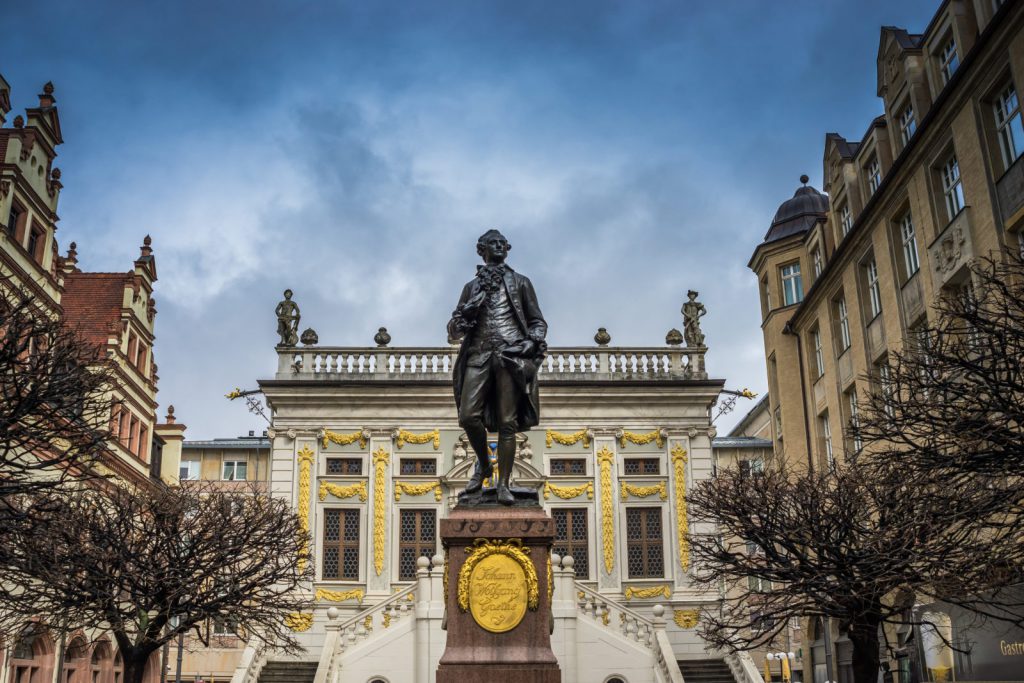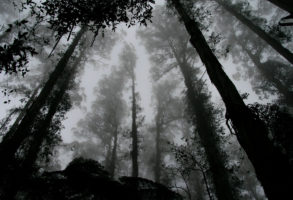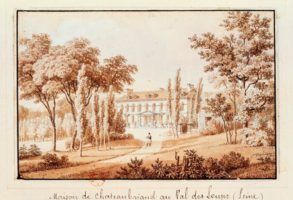There have been very few Renaissance men since the Renaissance—and they weren’t exactly thick on the ground even in their glory days. No modern figure is more worthy of that appellation than Johann Wolfgang von Goethe (1749-1832), who was not only the greatest German poet, playwright, autobiographer, and novelist (beside Thomas Mann), but also a painter at a time when that required ability and expertise, a statesman who effectively took over the administration of a small dukedom in his mid-twenties, and a scientist who made suggestive discoveries in zoology and botany and mounted an audacious challenge to Newton’s theory of optics. And Goethe was also a prime virile specimen who relished the pleasures of the body as well as those of the mind. His secretary Friedrich Riemer goggled in wonder at the physical grace and power of the middle-aged Goethe, a born athlete who had gained in muscle and finesse by extensive youthful practice: “One must see him, how strong and firm he stands on his feet, with what bodily agility and sure step he moves. Early gymnastic training, dancing, fencing, skating, riding, even coursing and racing, had given him this mobility and suppleness; he could never make a false step on the worst path or be in danger of slipping or falling; easily and swiftly he passed over smooth ice, narrow foot-paths and bridges, and rocky steeps.”
Leonardo da Vinci proclaimed that it is easy to make oneself a universal man; after all, to do so required of him only to be born a singular genius and to devote all his energy to developing his preternatural mind, eye, and hand. With Goethe as well Nature was profligate in dispensing her manifold capacities and charms, but he would not indulge in swaggering bravado about how easily he accomplished what he did. Despite his reputation for insufferable serenity, late in life he said that he had never known an interval of restful ease; his entire life had been one of striving, of unrelenting effort to cultivate his various talents and to harmonize the naturally discordant aspects of his character. Not that he was unaware of the great good fortune in his endowment; he would speak of the “inborn merit” that a natural aristocrat possesses and of his winning “the big prize” in the lottery of birth. But it took a lifetime’s hard work for that inborn merit to become the superior merit of extraordinary achievement.
What did it take for Goethe to become Goethe? What do his life and works mean for the rest of us? Rüdiger Safranski, the German biographer of Schiller, Schopenhauer, Nietzsche, and Heidegger, has ably confronted if not definitively answered these questions in Goethe: Life as a Work of Art. As remarkable as Goethe’s life was, Nietzsche said it was an event without consequences: While German intellectual historians refer to die Goethezeit (the Age of Goethe), he was not a world-historical individual in the Hegelian sense, one who embodied an epoch and who directed the course of human events as a Napoleon did. But Safranski for his part discerns abundant consequence in Goethe’s being “the exemplar of a life combining intellectual riches, creative power, and worldly wisdom. . . . It is the individual shape of this life that is endlessly fascinating. By no means was its course a foregone conclusion.”
How does one become himself—his best self—when democracy tends to make each of us more and more like everyone else? Goethe was fortunate not only in being born Goethe but also in living during the birth of the democratic era, that poignantly hopeful time when it seemed possible that ordinary men and women might be capable of genuine nobility, that freedom and equality might join forces to nurture the robust individuality of human beings at their highest reach. Those hopes have died very hard, leaking away in the lifeblood of the wounded left on the battlefield where freedom and equality, unable to be reconciled, have met in fateful collision. To speak today of personal nobility as democracy’s rightful aim would get you sneered at for unconscionable elitism or impossible dreaminess. Yet that is the very exaltation that Goethe wanted, not only for himself, but for everyone capable of overcoming his own flawed nature, an indifferent upbringing and education, and the tidal surge, already in Goethe’s day gathering all but irresistible momentum, toward universal mediocrity. Safranski does not quite reach such an understanding of Goethe’s significance, but this biography testifies to the singular glory that was Goethe’s life and suggests that with Goethe’s teaching as a guide the hope for democratic nobility might not yet be extinguished for good.
* *
Goethe was born nearly dead, the umbilical cord a noose around his neck. He grew up in Frankfurt in commodious upper-middle-class surroundings; his maternal grandfather had been the imperial city’s mayor, and his father had come into a substantial inheritance and had purchased the lofty title of imperial councilor. The elder Goethe saw great promise in his only surviving son and provided him with a fine education; in his youth Goethe learned Italian, French, English, Latin, Greek, and some Hebrew, studied drawing and music, wrote poetry, and received personal instruction from his father in geography, history, and law—the profession in which the father intended the son to follow him. Defying the patriarchal will on this count required bold resolution on the young man’s part, and Goethe knuckled under before he overcame, studying law at university rather than classics as he wanted to and practicing law for several years until literary success freed him from the paternal grasp—although as Safranski points out, his father helped support Goethe’s writing habit while they were working together. His first novel, The Sorrows of Young Werther, which appeared when he was 25, remains the most famous tale since Romeo and Juliet of lovelorn suicide, and as Safranski writes it is an object lesson in the perils of Romantic taedium vitae. The book made Goethe a European celebrity.
Bookish he certainly was from the beginning, but exploring the city excited him as much as reading did, as he writes in his autobiography, Poetry and Truth. To take in as much of the world as his mind could hold was a habit formed early: Everything interested the boy as it would the man, as he developed a taste for
observing the conditions of mankind in their manifold variety and naturalness, without regard to their importance or beauty. . . . We saw many thousand people amid their little domestic and secluded circumstances. From the ornamental and show gardens of the rich, to the orchards of the citizen, anxious about his necessities; from thence to the factories, bleaching-grounds, and similar establishments, even to the burying-grounds . . . we passed a varied, strange spectacle.
The earthly spectacle never wearied Goethe. Experience became his watchword. Although Bildung (self-development) was his foremost lifelong concern, obsession with one’s interior life repelled him. Late in life, in a passage Safranski cites, he declared suspect the philosopher’s imperative “Know thyself,” which tends to “entice [one] away from activity in the external world and into a false, inner contemplativeness. Man knows himself only to the extent that he knows the world, and he becomes aware of the world only in himself and of himself in it.” Bildungdemanded that one come to know his true self by searching, probing, ransacking the vast world outside himself. For Goethe the project of self-development involved the intake on a heroic scale of other men’s works, as well as a fruitful gregariousness; the import of reading, looking at paintings and sculptures, listening to music, and encountering men quite different from himself lay principally in learning what most closely implicated his own nature and enhanced his own energy and productiveness. Goethe was the paragon of encyclopedic cultivation, the most learned of the modern masters, immersing himself in the acquired wisdom and beauty of the ages, incorporating with the intention of embodying the best in art, philosophy, religion, history, statesmanship, and science, and transforming these accumulated riches into a treasure uniquely his own.
Nor was his knowledge limited to the best that had been thought and said. He was well-acquainted with the ordinary life of humanity as well, and if he was a latecomer to the sensual feast, which he first really enjoyed during his Italian journey of 1786-1788, he became an aficionado of the pleasures all men and women have in common. The Neapolitan whirling riot of delight captivated him: “Naples is a Paradise. Everyone lives in a kind of drunken abandon. I’m the same way. I hardly know myself. I seem a completely different person. Yesterday I thought: either you used to be mad, or you’re mad now.” The Roman Elegies recount the sexual adventures that meant at least as much to him as the magnificent ruins of the ancient city and the works of Michelangelo and Raphael: “We enjoy the delights of the genuine naked god, Amor, / And our rock-a-bye bed’s rhythmic, melodious creak.” On returning to staid and proper Weimar, where he resumed his duties as privy councilor to Karl August, the future Grand Duke of Saxe-Weimar-Eisenach, he met the 23-year-old Christiane Vulpius, and soon they were making love. She was a “girl of the people” who worked making artificial flowers. Goethe would father their son and eventually marry her; the most notorious misalliance in literary history scandalized the ladies of the court, but Goethe knew what he needed and wanted where love was concerned and he did as he chose.
* *
He did as he chose. And yet Thomas Mann, in the 1922 novella-length essay “Goethe and Tolstoy”—the finest critical essay I know—declares that the “pathos of renunciation” was the general motif of Goethe’s career and very existence, “cast[ing] such a Christian shade upon the pagan, aristocratic, child-of-nature well-being of Goethe’s life.” Mann takes his cue, I believe, from Nietzsche’s description in The Case of Wagner of the opera Tannhäuser as the drama of Goethe’s struggle for his soul with the German populace, in which Wagner takes the side of the morally wholesome Christian nation; following Nietzsche, Mann rightly declares that “there were in Goethe possibilities of a greatness and growth wilder, ranker, more disruptive, more ‘natural,’ than those which his instinct for self-conquest allowed him to develop.” Instead, the “civilizing work” of “moral culture” became his choice, his duty, and his burden. Thus the play Iphigenia in Tauris (1787), in which Orestes rescues his sister from long captivity by the Taurian king Thoas, ends with the triumph of civilized gentleness over barbaric fury, a woman’s high-minded regard for truth over manly eagerness to fight and kill. And in the tragic drama Torquato Tasso (1790), the honored poet’s impetuousness and importunity shatter against the noble man of action Antonio’s adamant self-possession, and in the recoil from this disappointed bid to be regarded Antonio’s equal in nobility Tasso makes an impossible, mad profession of love for the Princess d’Este that gets him banished from the court: The proprieties are sovereign, and not even acknowledged genius may dare to violate them.
But Mann to the contrary, Goethe’s two greatest works, Wilhelm Meister’s Apprenticeship and Faust, end in fulfillment rather than renunciation. Wilhelm Meister, who grew up in a well-ordered and prosperous bürgerlich household not unlike Goethe’s, is certain as the novel begins that he has found his vocation and his true love, in the theatrical life and in the arms of the beautiful actress Mariana. His childhood was vividly colored by his reading and enacting of chivalric romance, and his dream of the future is shaped by fictional heroes and heroines whose excellence he hopes to find somehow in the modern world. Wilhelm wants to live a noble life, but for instruction he has only these archaic and unreal characters, and he suffers from the delusion that in an actor’s imagination and imitation he will come to embody genuine nobility. His first love does not work out as he hoped, the itinerant actor’s lot proves distinctly seedy and money-grubbing, and the actual nobles he meets are as hopelessly flawed as the common run of humanity. By way of mischance and misfortune turned to heroic advantage, and erotic entanglements as knotty as the advanced moves in the Kama Sutra, Wilhelm comes into his rightful life, with the invaluable guidance of the Brotherhood of the Tower, a secret society of gifted and experienced men of practical wisdom who allow him to persist in error until he stumbles toward the truth: It is as though Sarastro and the priests and knights of his temple in The Magic Flute were set down in the moral landscape of Tom Jones, with Wilhelm clueless as Papageno but rewarded as generously as Prince Tamino. Wilhelm Meister’s Apprenticeship is the most hopeful and joyous of great novels, in which an ordinary man’s bewildered striving ends in a noble triumph.
There is nothing ordinary about Faust: He is the most remarkable literary hero since Prospero. The Faust legend dates from the early 16th century, and its most famous treatment before Goethe’s was Christopher Marlowe’s Doctor Faustus (ca. 1589). Goethe breaks decisively with the tradition: Although Faust: A Tragedy is the play’s full title, it ends not with the customary damnation of the overreacher who made an imprudent deal with the devil but rather with his assumption into heaven. This although Faust has not exactly conducted himself as a worthy Christian soul. With the assistance of his familiar demon Mephistopheles he not only corrupted the innocent beauty Gretchen, who was executed for murdering their infant son, he also killed her brother in a street brawl. But Faust does repent those trespasses, and in the estimation of Goethe’s God, who as in the Book of Job bets the devil that his man will prove deserving of salvation, the hero epitomizes humanity at its fullest extension heavenward—for he is an indefatigable striver. Faust tells Mephistopheles that he wants to know the full measure of human experience, to feel the most agonizing suffering as well as the most exquisite pleasures. And he bets the devil that he will never rest content even with the utmost happiness: If he should ever tell the sweet moment to linger, his soul shall belong to hell. In fact Mephistopheles wins that wager; Faust is so bemused by his heroic land-reclamation operation—the triumph of the modern scientific project, which will create a new Eden—that he wants the moment of victory to last and last: “I savor now my striving’s crown and sum.” But Mephistopheles botches his chance to consign Faust to perdition because he is meanwhile bemused by the fetching bottoms on the angelic host. So the angels beat the devil to the punch, and as they bear Faust’s immortal essence to glory, they proclaim: “Whoever strives in ceaseless toil, / Him may we grant redemption.” Here is Goethe’s profession of faith: Faust is saved because he has a soul like his creator’s, and conventional notions of the Creator are ruled out of court. It was likely Faust whom Victor Hugo had in mind when he observed that the problem with Goethe was that he let his indifference to good and evil go to his head.
Goethe was never a driven God-seeker, but he did eventually find the only God he could believe in, after sorting his way through the various gods he considered impossible to worship. Comfortable though his childhood was, he learned early that the reputedly benevolent Christian God was not to be trusted; news of the devastating Lisbon earthquake of 1755 loosed “the demon of terror . . . over the earth” and shattered the calm of the 6-year-old boy. A violent local hailstorm, which seriously damaged the Goethe house and brought the whole household literally to its knees “to conciliate the wrathful Deity” drove the lesson home. Yet these outbursts of divine malice or capriciousness did not distress him as much as the sheer wonder at Nature and Nature’s God filled him with joy: He exulted always in “the beauty of the world, and the manifold blessings in which we participate while upon it.”
Ravished by beauty, thrilling to noble human possibilities, he found the doctrine of original sin repugnant; this was not a fallen world but the one God had intended it to be all along, which pre-Christian men, the Greeks of their golden age in particular, had once made the most congenial home by conjoining the various gifts with which nature has endowed humanity to form a perfect whole. In the 1805 essay “Winckelmann and His Age,” Goethe writes, “Modern man often loses himself in the infinite before finally returning if possible to a limited point of reference. . . . The ancients, however, immediately felt completely at home within the pleasant boundaries of this beautiful world. Here was their natural habitat, here was the setting for their activities and here the focal point of their passions.” So Goethe might seem to be a natural-born pagan, who found nothing in Christianity to recommend it—and indeed, he notoriously lumped together his distaste for “tobacco (the smoke), bedbugs and garlic and † [the Cross].”
However, in one of the last Conversations with Goethe (which Nietzsche called the best German book there is), his confidant and memorialist Johann Peter Eckermann records the following:
Yet I look upon all four Gospels as thoroughly genuine; for there is in them the reflection of a greatness which emanated from the person of Jesus, and which was of as divine a kind as ever was seen upon earth. If I am asked whether it is in my nature to pay Him devout reverence, I say—certainly! I bow before Him as the divine manifestation of the highest principle of morality.
Lest Christians be too pleased with this reverence, which in any case the attentive Christian reader will find not quite reverent enough, Goethe goes on to say in the very next sentence:
If I am asked whether it is in my nature to revere the Sun, I again say—certainly! For he is likewise a manifestation of the highest Being, and indeed the most powerful which we children of earth are allowed to behold.
And among the mere children of earth, Goethe declares in closing, there are those “noble beings . . . divinely endowed,” such as Mozart, Raphael, and Shakespeare, who transcend the limitations of “ordinary human nature.” In bringing forth men of this order, and Goethe says there are others of comparable perfection who go unmentioned—one assumes he makes this omission in all humility—God continues His “plan of founding a nursery for a world of spirits upon this material basis. So He is now constantly active in higher natures to attract the lower ones.” Goethe’s God, then, is conceived in a spirit liberal and meritocratic: He fulfills the requirements for Christian morality, which is the democratic morality of universal compassion; natural beauty and power; appreciation for human individuality that doesn’t necessarily comply with religious orthodoxy; and recognition that some men are superior to others and that the very best men are to help nurture nobility in the lesser. Except for that last quality, he sounds like a deity well-suited to modern sensibilities.
* *
And yet Goethe himself seems not so well-suited for our times. What is it that keeps him from being a modern cultural hero like, say, Jean-Jacques Rousseau, the other principal and many-sided genius of the early democratic era? The problem may be that Goethe is both too noble and too normal. To Goethe’s mind, there was nothing wrong with middle-class prosperity and peace, “that happy and easy condition”; the Rousseauian disdain for the selfish and fearful bourgeoisie held no appeal for him. Goethe’s genius encompassed the admirable virtues of common sense, which Rousseau saw as the nemesis of genius such as his own. For to Goethe common sense included the invaluable lesson of what he had in common with all men—“that, whatever comes to pass, he may consider that it happens to him as a man, and not as one specially fortunate or unfortunate.” Rousseau for his part understood his special good fortune as a man of genius to be his special misfortune as an outcast scorned by ordinary men, with whom he had almost nothing in common but mutual contempt.
From the consummate self-adoration and self-pity of Rousseau emerged the cult of the artist as a being apart from unworthy society and suffering numberless unjust miseries at its hands. From Goethe no tradition to the contrary has developed—one of art “to make man contented with the world and his condition,” as Goethe told Eckermann poetry ought to do. This failure to produce a line of descendants is part of what Nietzsche means by an event without consequences. However, that Goethe has no rightful heirs—although Nietzsche himself was his most significant admirer and Thomas Mann his most eloquent one—is evidence not of sterility but rather of incommensurable vital force. Rousseau has begotten epigones and imitators right and left because his combination of colossal arrogance and abject weakness is readily imitable; Goethe has not done so because his self-possession and his acceptance of the world as it is—his amor fati, or love of his fate, to use a Nietzschean term—are exceedingly hard to come by. The sight of unattainable human excellence can be dispiriting. It can also be just the right challenge to creatures made for noble striving.
Algis Valiunas is a fellow at the Ethics and Public Policy Center.










